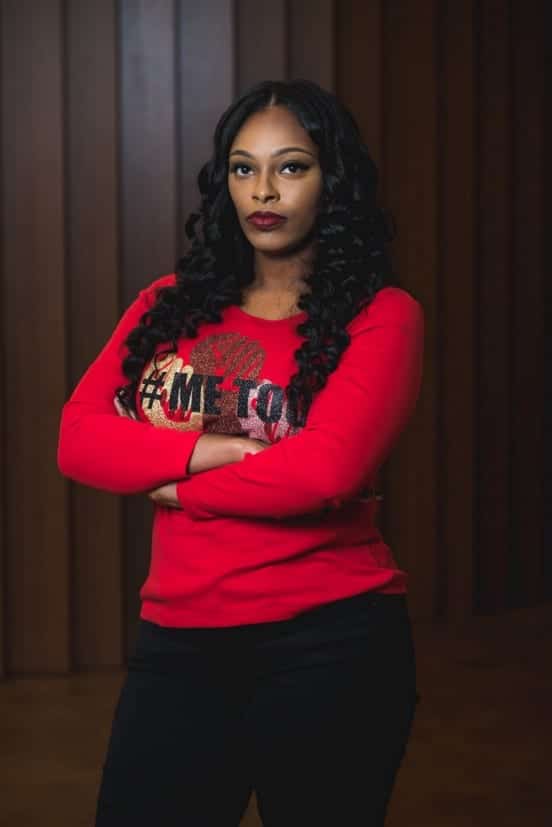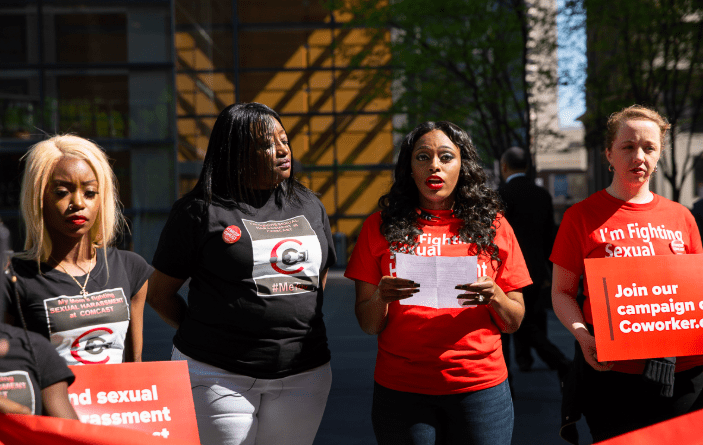Addressing Workplace Harassment Collectively
JUN 14, 2018 | COWORKER.ORG
How everyday, working women are fighting workplace harassment at Comcast
On May 2, 2018, Laterrica Perry along with two other former Comcast employees hand delivered their petition to the company’s Philadelphia headquarters in order “to change the way the corporation handles workplace harassment as a whole, starting from the reporting process”. While working at the telecommunications company, Perry said she experienced unwanted sexual advances and retaliation from her supervisor. This led her to join a Coworker.org campaign fighting sexual harassment at Comcast.
We asked Perry about her experience advocating against workplace harassment and how she found the courage to tell her story.
One of the biggest moments of your campaign so far has been delivering your petition to the Comcast headquarters in Philadelphia. Why did you decide to hand deliver your petition to the Comcast headquarters?
I think showing up at the Comcast headquarters was more impactful. There were lots of reporters there who helped get our message across through the media. More importantly, I think it was definitely helpful to be there on site to see if someone from the Comcast corporate office would be willing to meet or speak with us so that we could solve the issue together.
Take us back to the moment when you arrived at the Comcast headquarters. What was that like? How did it feel to see all these cameras and microphones pointed your way?
It felt good. It felt good to see that there were reporters that weren’t afraid to let our voices be heard. It’s intimidating for me, a former Comcast employee — and even for some attorneys — to push back on anything that Comcast does because they are such a huge corporation. Overall, I think our petition delivery brought more awareness to the issue of sexual harassment within Comcast. Before this, our experiences might not have been getting to the corporate level, but now our message has likely gone to the most senior person who handles harassment procedures at Comcast.
“It’s intimidating for me, a former Comcast employee — and even for some attorneys — to push back on anything that Comcast does because they are such a huge corporation.”
In your speech at the Comcast headquarters, you said, “We often hear about the sexual harassment epidemic in Hollywood through the media, but everyday working women like myself are victims and go unheard.” Why is it important for you to bring visibility to the issue of sexual harassment that everyday, working women face?
I think it’s important because everyday, working women like myself do not have the same kinds of resources that women in Hollywood have to get their stories out and their voices heard. For example, in terms of financial resources, women in Hollywood often have the money to get the best attorneys to represent them, but for regular working people, we don’t have that. Big corporations can easily take advantage of working people like me because they have so many lawyers and resources to fight these cases. So I think that shedding light on this issue opens the door for other middle and working class people to come forward and really show the world how big and entrenched the issue of harassment is.
What kinds of struggles did you face as a result of not having the same access to resources as, for example, women from Hollywood?
When I experienced harassment at Comcast, I felt that I didn’t even have access to the legal channels to protect myself or fight back against what had happened to me. Before the TimesUp Legal Defense Fund, getting legal representation wasn’t financially accessible for me. A lot of the attorneys that I reached out to wouldn’t even give me a consultation without some type of fee. For a person who doesn’t have a lot of funds available, it was almost impossible to determine which lawyer would be a good fit to represent me or find a lawyer who would be willing to represent me at all. It was a constant battle because I could consult with a lawyer who hears my case and decides that they do not want to represent me. Then, I would be out of money because I consulted with them — and still not have any legal representation.
“For a person who doesn’t have a lot of funds available, it was almost impossible to determine which lawyer would be a good fit to represent me or find a lawyer who would be willing to represent me at all.”
Sexual harassment (and workplace harassment, more generally) is a very difficult issue to address and talk about. How did you find the courage to speak up about your experiences at Comcast?
The horrible way Comcast treated me throughout the reporting process made me want to speak up. I knew that if this could happen to me, then it probably happened to other people too, including other people who were in the same center that I worked in. I wanted to make them feel empowered and think “Hey, if Laterrica came forward and she was brave enough to tell her story, then I should come forward and be brave enough to tell my story as well”. I believe that if we all stand up and bring forth this issue, at some point Comcast has to realize that this isn’t just an isolated thing. It’s an issue that is happening to multiple people and that they need to find a way to solve it.
You joined Rylinda’s campaign fighting sexual harassment at Comcast during the fall of 2017. What have you learned about advocating against workplace harassment since then?
I learned that there are different avenues, approaches and ways to go about reporting and speaking out about workplace harassment that aren’t always through the legal system. Before I joined the campaign, I didn’t know that something like a petition delivery was actually possible and I wasn’t familiar with resources that could help me like Coworker.org. Through this process, I learned more about the overall support and help I can get advocating against workplace harassment.
“I knew that if this could happen to me, then it probably happened to other people too.”
Through the campaign on Coworker.org, you connected with several other women who say that they also experienced sexual harassment while working at Comcast. You have come together with them to form the TimesUp Comcast Leadership Committee. What has being in community with these women meant to you?
It means a lot to me because it gives me hope that I’m not in this by myself. It’s like having a support system because we can all come together collectively, share our journeys and our experiences, and decide how we want to continue this journey to advocate for a safer work environment at Comcast.
Coworker.org is a global platform to advance change in the workplace. Our technology makes it easy for individuals or groups of employees to launch, join and win campaigns to improve their jobs and workplaces. You can start your own campaign about changes you want to see in your workplace on Coworker.org here — or contact us at [email protected] if you would like to discuss a workplace issue with our team.
FIGHTING DISCRIMINATION AND WORKPLACE HARASSMENT




